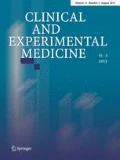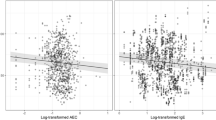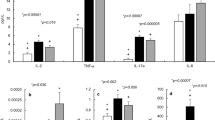Abstract.
Morbidity and mortality in cystic fibrosis patients is mainly attributed to pulmonary infection and inflammation. Chemokines play a pivotal role in the inflammatory process. Although genotype-phenotype correlation in cystic fibrosis patients has been defined, a clear relationship between the defect in the cystic fibrosis transmembrane regulator (CFTR) gene and pulmonary inflammation has not been established. The aim of this study was to assess whether serum chemokines levels in cystic fibrosis patients correlate with genotype and pulmonary function tests, as well as with other clinical characteristics. Serum levels of interleukin-8, RANTES, and monocyte chemoattractant protein-1 were measured in 36 cystic fibrosis patients grouped according to their genotype. Group A included 25 patients who carried two mutations associated with a pathological sweat test and pancreatic insufficiency (ΔF508, W1282X, G542X, N1303K, S549R). Group B included 11 compound heterozygote patients who carried one mutation known to cause mild disease with borderline or normal sweat test and pancreatic sufficiency (3849+10kb C to T, 5T). Associations between chemokine levels, genotype, pulmonary function, Pseudomonas aeruginosa colonization, age, sweat chloride level, and pancreatic and nutritional status were examined. Mean interleukin-8 and monocyte chemoattractant protein-1 levels were significantly higher in group A than group B (11.4±2.1 pg/ml vs. 5±0.9 pg/ml and 157±16 pg/ml vs. 88.8±16.4 pg/ml, respectively) (P<0.01). No difference in RANTES levels were found between groups. interleukin-8 levels were inversely related to forced expiratory volume in 1 s (r=-0.37, P<0.02), while there was no association between the latter and RANTES and monocyte chemoattractant protein-1 levels. The Pseudomonas colonization rate was higher among group A patients than group B (88% vs. 40%, P<0.01). No relationship was found between measured chemokines and age, sweat chloride levels, and pancreatic and nutritional status. Our study demonstrates an association between interleukin- 8, forced expiratory volume, and cystic fibrosis genotype. Hence, elevated interleukin-8 serum levels could serve as an indicator of an early inflammatory process and encourage the initiation of anti-inflammatory treatment.
Similar content being viewed by others
Author information
Authors and Affiliations
Corresponding author
Rights and permissions
About this article
Cite this article
Augarten, A., Paret, G., Avneri, I. et al. Systemic inflammatory mediators and cystic fibrosis genotype. Clin Exp Med 4, 99–102 (2004). https://doi.org/10.1007/s10238-004-0044-1
Received:
Accepted:
Issue Date:
DOI: https://doi.org/10.1007/s10238-004-0044-1




